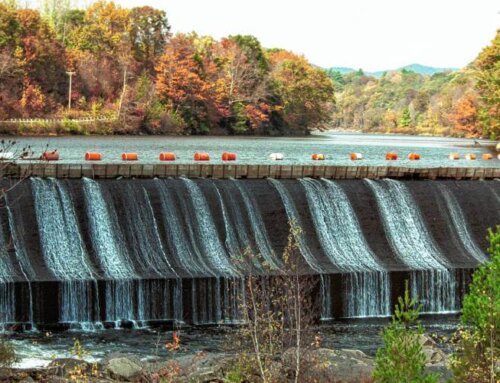FirstLight, the owner and operator of Turners Falls Dam and the Northfield Mountain Pump Storage Project, and a set of stakeholders, including towns and regional government as well as recreation-focused organizations, recently submitted a proposed settlement agreement related to recreation. CRC had been involved in these negotiations and had even signed an earlier version of the agreement, called the Agreement in Principle, but we declined to sign this final version after last-minute additions that we oppose.
Before we get into our concerns about the agreement, we want to highlight why FirstLight is offering recreational amenities and our support for several of the proposed additions.
Why
Rivers and waterbodies across the country are held in “the public trust,” a core environmental doctrine that determines the public have a right to natural resources such as rivers, oceans and the air. In this way, the public is guaranteed access to these resources. While this doctrine provides only a human-centered approach to resource conservation and access, it does help establish pathways for public access to some of the country’s most vital and beautiful ecosystems. As a conservation organization, we know that access is not only a right for all people but also begets environmental stewardship.
When hydropower companies construct and operate their facilities along waterways, they are using a publicly held resource for private gain. These facilities disrupt and limit the public’s access to rivers and the hydropower companies are obligated to provide recreational amenities to the community to offset this impact.
What
The recently submitted recreation agreement includes several improvements that will enhance the experience of those who recreate within the Connecticut River valley, while providing economic opportunities to local businesses in the nearby towns. The agreement maintains most existing facilities and services and provides a few new ways to enjoy the area.
- Paddlers can look forward to improved and new access areas above and below the dam, with newly constructed access trails and put ins. For the through paddlers, there will be two new campsites to spend the night, and for those who love to paddle around Rock Dam, a new portage trail.
- If you want to cast a line in the area, with the addition of new stairs, you’ll no longer have to slip-slide down the Cabot Woods access area, plus there will be better river access at Station No. 1 and below the dam.
- Climbers will be assured that the beloved climbing areas of Farley Ledges will be under a permanent conservation restriction and Rose Ledge will be added as a project recreational facility.
- Trail users can enjoy an additional five miles of trails for mountain biking at Northfield Mountain and a portion of the New England National Scenic Trail will be permanently conserved.
- For those who prefer to enjoy the river with a picnic and a view, FirstLight will construct two new pocket parks, install interpretive signs and create a picnic and viewing area below the dam. There will also be a new ADA accessible dock.
- For everyone, the flow notification website will provide real and forecasted water level and flow data, so you know what to expect when you visit the river.
What led us to “no”
As mentioned above, CRC initially signed an earlier version of this agreement, called the Agreement in Principle. We fully intended to sign this agreement as well, until some late-game additions that we simply could not support.
- First, the agreement includes a condition that anyone who signs it cannot oppose the Flows and Fish Passage Settlement Agreement. We are strongly opposed to several (but not all) conditions of that agreement; you can read about our opposition here. For one, the summer minimum flows proposed by the company in the agreement don’t even provide enough water to paddle through the area on a kayak!
- Second, a new condition requires parties to support FirstLight’s request for a 50-year license term, which, again, we oppose given the lack of justification for this extended license term over the next several decades of rapid climate change.
CRC is frustrated and disappointed that these two conditions were slipped in, effectively forced recreation stakeholders to choose between the benefits of the recreation agreement and maintaining the freedom to oppose the flow and fish agreement and a 50-year license. In doing this, FirstLight demonstrated that they are more interested in muting the voices of stakeholders than they are in actually achieving an agreement on recreation.
As these intentions became clear, it was an easy decision to forego signing a recreation agreement that required us to forfeit our ability to oppose the flow and fish agreement.
While these are our two primary concerns, it is also disappointing that CRC was removed from the ‘Recreation Advisory Group (“RAG”),’ which will participate in decision-making and scheduling related to recreation management and planning. In doing this, FirstLight has essentially said that unless we sign their agreement, we can’t participate in these conversations for the next half century.
Finally, CRC believes the agreement could do more to make information accessible in multiple languages, manage invasive species to ensure recreational access, make cross country skiing and educational activities at Northfield Mountain free (do they really need to charge for this?), maintain fat biking trails when winter conditions don’t allow skiing, convert lighting to be ‘dark sky’ compliant, and create specific opportunities for environmental justice and indigenous community members, as well as those with disabilities.
Though we think there is room for improvement, CRC welcomes the new additions included in the recreation agreement.
*FirstLight had initially intended to come to a comprehensive settlement agreement that would include agreement on several content areas. They were ultimately unable to do this and so, when given a deadline of March 31, 2023, the company submitted only a partial agreement, the Flows and Fish Agreement. The recreation agreement is a separate agreement that would’ve been included in a comprehensive settlement, had that been achieved.







